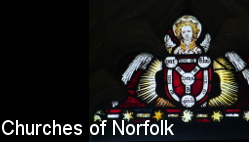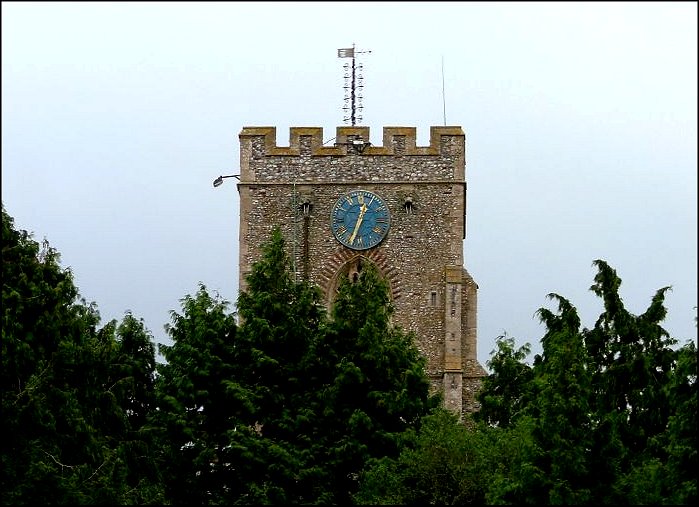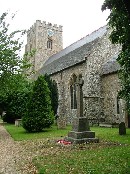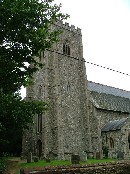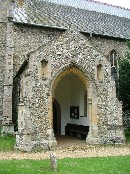| |
|
St Mary,
Docking
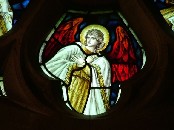 |
|
There
is a ridge of hills to the south of West Runton
which includes the highest point in Norfolk, but
nobody lives there. For the highest settlement,
you need to come some thirty miles to the east,
and just before Norfolk disappears into the Wash
you reach Docking, above the holiday resorts of
Hunstanton and Heacham. Docking is
the highest village above sea level in the
county, and to stand on the top of the tower here
would make you the highest person in Norfolk.
Steve Greef, a friend of the site, passed on to
me the local lore that if the sea rose to cover
the spire of Snettisham church it would still
only be lapping at the door of St Mary, Docking.
|
St Mary is
a fairly typical East Anglian town church of the mid-15th
century, retaining the chancel of its predecessor. There
is an irony in the fact that the top of Docking church
tower is so significant, because from most angles it is
all that you can see. This is a large village, and a
large church, which is somewhat hemmed in by tight roads,
the graveyard being full of mature trees. Try as I might,
there was nowhere that I could stand and take it all in
at one go. This is actually very attractive and
interesting, although a little frustrating if you are
trying to take a photograph.
As you
would expect in this part of Norfolk, Frederick Preedy
was responsible for a restoration, which is no doubt why
the exterior is so attractive. However, Ewan Christian
came along a few years later in the 1880s and redid the
interior. But when you step into the huge nave, your
thoughts will probably not be on either of them, for your
first sight is of Docking's greatest treasure, one of the
loveliest late medieval fonts in East Anglia.
The shape
is elegant a narrow, chunky bowl in a proportion with the
stem which gives the whole piece the appearance of a
large chalice. The panels appear to show Apostles, but it
is the beautiful stem which draws the eye, because here
are eight female Saints in animated poses. Most easily
identifiable is St Catherine with her wheel and sword,
but there is also St Apollonia with her pincers, and,
intriguingly, three seated figures holding babies. One of
them appears intended as the Blessed Virgin and child,
while another is probably St Anne holding the infant
Virgin. The third may well be intended as St Elizabeth
with the infant John the Baptist.
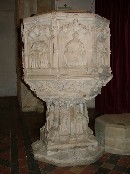 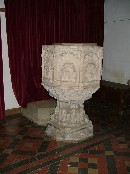 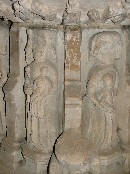
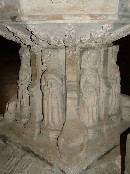 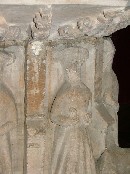
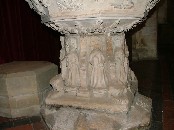 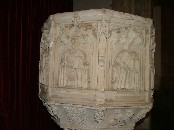
Apart from
the font, there are no major medieval survivals. But
there are some very successful Victorianisations of large
medieval churches in this part of Norfolk, and Docking is
certainly one of them. The glass is a delight. The most
modern glass is the most striking, a compilation on the
theme of bread which draws together the manna in the
desert, the Last Supper, and the Eucharist. Of the
earlier 20th century and Victotorian glass, there are
some very fine details, incuding St Luke shown holding
the icon he has painted of the Blessed Virgin and child,
and a gorgeous scene of the Finding in the Temple, the
face of Christ full of wisdom. There is a
heart-stoppingly beautiful St Cecilia, and the collection
includes some gorgeous angels.
But
perhaps the most haunting window here shows a scene which
is rarely laid in modern English church glass. This John
Hardman's 1948 depiction of the story of St Gregory in
the market place in Rome, coming across a group of
English slaves and being struck by their beauty. When
told where they had come from, he replied Non Angli,
sed Angeli - 'not English, but Angels'. All about,
other angels look on.
|
|
|
